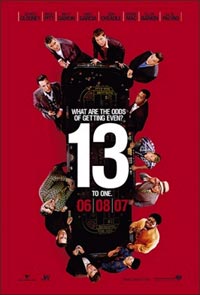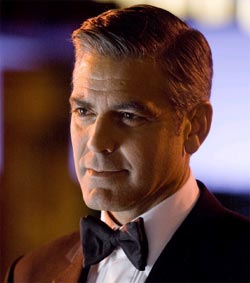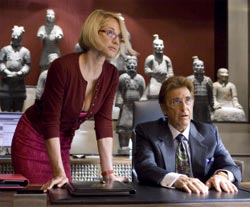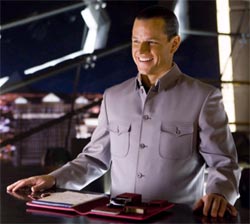 Ocean’s 13 (2007, Dir. Steven Soderbergh):
Ocean’s 13 (2007, Dir. Steven Soderbergh):
Willie Bank: This town might have changed, but not me. I know people highly invested in my survival, and they are people who really know how to hurt in ways you can’t even imagine.
Danny Ocean: Well, I know all the guys that you’d hire to come after me, and they like me better than you.
You might think that the exchange above is an appetizer, a portent of things to come: a battle of wits and brawn between real estate magnate and all-around scumball Willie Bank (Al Pacino) and our slick operator with the heart of gold, Danny Ocean (George Clooney). That the exchange comes at the climax of the film and is meant as the final word says all you need to know about the third installment in Steven Soderbergh’s unexpected trilogy of caper movies: any hint of menace or danger is shrugged off with a smart-aleck line. Ocean’s 13 is a thriller without the sweat, a souffle without an ounce of fat or sugar.
 Which is not to say that it’s surprising that these movies have proven to be popular. Heist flicks have a long and storied history, and the original thinking behind Soderbergh’s update of the Rat Pack pseudo-classic from the 60s was unassailable: take the only American actor today capable of channeling the cool-cat calm of the old-style Hollywood stars (Clooney), surround him with a gaggle of young upstarts (Matt Damon, Casey Affleck), veteran hambones (Elliott Gould, Carl Reiner), and respected character actors (Andy Garcia, Don Cheadle), throw in Brad Pitt for good measure, and stir it all into a frothy, if not necessarily heady, brew.
Which is not to say that it’s surprising that these movies have proven to be popular. Heist flicks have a long and storied history, and the original thinking behind Soderbergh’s update of the Rat Pack pseudo-classic from the 60s was unassailable: take the only American actor today capable of channeling the cool-cat calm of the old-style Hollywood stars (Clooney), surround him with a gaggle of young upstarts (Matt Damon, Casey Affleck), veteran hambones (Elliott Gould, Carl Reiner), and respected character actors (Andy Garcia, Don Cheadle), throw in Brad Pitt for good measure, and stir it all into a frothy, if not necessarily heady, brew.
For all its complicated jiggering and plot feints, Ocean’s 11 coasted by on Clooney’s charm, even as he was saddled with the charmless Julia Roberts as his would-be girlfriend; while the film had fun with the boys-will-be-boys shenanigans of the central heist, making the crux of the story a tug-of-war between Clooney and Garcia for Roberts’ heart tended to sully the mix. The less said about Ocean’s 12, with its French New Wave poses and over-reflexivity (Julia Roberts’ character pretends to be Julia Roberts the actress, how cute!), the better.
Ocean’s 13 gets off to a promising start: Danny Ocean is back to his knight-errant ways, as his mentor and pal Reuben (Gould) is swindled out of his life savings and a prime piece of real estate by Pacino’s Bank, and left in the hospital with a coma. Vowing to get even, Ocean calls in his trusty right-hand man Rusty Ryan (Pitt) and reunites with his team on his home turf of Vegas, where Bank is scheduled to reap the fruits of his illicit labors with a garish new casino titled The Bank, appropriately enough. The Ocean gang’s assignment: force the casino to go belly-up on its opening night. No ladies to moon over this time — when Pitt asks where Roberts is, Clooney pointedly declares, “It’s not their fight.” That line, reinforcing the boys-have-more-fun mantra that propelled the best parts of Ocean’s 11, suggests that we’ll have a similarly fun outing this time around.
 And it’s fun for a little while, as Ocean and his boys pull together all the cons that will derail The Bank: everything from loaded dice to one of the underground drills that helped build the Chunnel between England and France, all the better to short-circuit The Bank’s ultra-advanced AI security system and simulate an earthquake at the appropriate moment. Along the way, we get a host of guest stars — Eddie Izzard as a hacker genius, Ellen Barkin as Bank’s overbearing and undersexed assistant, David Paymer as a hotel reviewer who is about to have the worst stay in the history of casino stays, and Vincent Cassel as a French jewel thief (because you can’t have a heist movie without a French jewel thief). We’re also treated to unusual sights such as Matt Damon donning a fake nose and seducing Barkin with the help of a pheronome mist; Casey Affleck in a Zapata mustache inciting Mexican sweatshop workers to strike (a complication that is resolved with a simple payout of $36,000, by far the smallest amount of cash paid for anything in this film), Don Cheadle in an Evel Knievel costime, and Clooney tearing up at the sight of Oprah Winfrey helping out some disadvantaged kids on television (a seemingly throwaway moment that leads to the movie’s funniest bit).
And it’s fun for a little while, as Ocean and his boys pull together all the cons that will derail The Bank: everything from loaded dice to one of the underground drills that helped build the Chunnel between England and France, all the better to short-circuit The Bank’s ultra-advanced AI security system and simulate an earthquake at the appropriate moment. Along the way, we get a host of guest stars — Eddie Izzard as a hacker genius, Ellen Barkin as Bank’s overbearing and undersexed assistant, David Paymer as a hotel reviewer who is about to have the worst stay in the history of casino stays, and Vincent Cassel as a French jewel thief (because you can’t have a heist movie without a French jewel thief). We’re also treated to unusual sights such as Matt Damon donning a fake nose and seducing Barkin with the help of a pheronome mist; Casey Affleck in a Zapata mustache inciting Mexican sweatshop workers to strike (a complication that is resolved with a simple payout of $36,000, by far the smallest amount of cash paid for anything in this film), Don Cheadle in an Evel Knievel costime, and Clooney tearing up at the sight of Oprah Winfrey helping out some disadvantaged kids on television (a seemingly throwaway moment that leads to the movie’s funniest bit).
 Overstuffed? It most certainly is that, and Soderbergh, ever the cinephiliac, throws in references to at least a dozen other movies (a 20-second scene with Damon in London exists just so Soderbergh can throw in some shaky-cam action cribbed straight from Damon’s Jason Bourne flicks). It all shoots forward agreeably enough, with Soderbergh coating scenes with every day-glo color in the book (the red lighting doesn’t do Clooney and Pacino any favors) and indulging in split screens and other editing tricks just because, well, he can. All this flash doesn’t disguise the hole at the heart of the narrative, though. The best caper movies work on two levels: they involve us in the caper artists’ complicity, and then they make us sweat along with them as they carry out the heist. Rififi, the granddaddy of them all, is the blueprint: with nothing more exotic than carpentry tools and a can of shaving cream, we are let in on the thieves’ plan every step of the way, bite our fingernails with them as they carry out their heist, and then nibble some more in the aftermath, when every little thing that could possibly go wrong threatens to ensnare them.
Overstuffed? It most certainly is that, and Soderbergh, ever the cinephiliac, throws in references to at least a dozen other movies (a 20-second scene with Damon in London exists just so Soderbergh can throw in some shaky-cam action cribbed straight from Damon’s Jason Bourne flicks). It all shoots forward agreeably enough, with Soderbergh coating scenes with every day-glo color in the book (the red lighting doesn’t do Clooney and Pacino any favors) and indulging in split screens and other editing tricks just because, well, he can. All this flash doesn’t disguise the hole at the heart of the narrative, though. The best caper movies work on two levels: they involve us in the caper artists’ complicity, and then they make us sweat along with them as they carry out the heist. Rififi, the granddaddy of them all, is the blueprint: with nothing more exotic than carpentry tools and a can of shaving cream, we are let in on the thieves’ plan every step of the way, bite our fingernails with them as they carry out their heist, and then nibble some more in the aftermath, when every little thing that could possibly go wrong threatens to ensnare them.
In marked contrast, Ocean’s 13 is as grand and unapproachable as a magician’s trick: We see expensive pieces manuevered into place, and are meant to gasp in awe at how it all comes together, but it’s not half as fun as knowing what the trick is beforehand and wondering if these guys can actually pull it off. And forget about the aftermath; once the heist is over, our heroes are free and clear, without a single threat of retaliation, or a sidewise glance over their shoulders.
Maybe Ocean’s 13 is just a souffle, and shouldn’t be looked upon as more than a confection, but it does seem pretty leaden for something that’s supposed to be light on its feet. The plot is so busy slotting characters into their roles that no one is given room to manuever. Even Clooney and Pitt seem utterly detached: their major role in the affair seems to be sitting around in swank pads and discussing pros and cons. It’s one thing to be too cool for school, but it’s quite another to be an expensive silk suit sipping iced tea by a poolside and exchanging vaguely cutesy-cryptic dialogue:
 Rusty Ryan: Relationships can be so…
Rusty Ryan: Relationships can be so…
Danny Ocean: Sure.
Rusty Ryan: But they’re also…
Danny Ocean: That’s right.
Stranded on the sidelines, Clooney looks peaked here, like Sinatra after a three-day bender, while Pitt is left spouting meta-commentary about Clooney the star’s love life (“When are you going to settle down, get married?”). The others don’t fare much better: it’s good to see Barkin onscreen again, but she’s treated cruelly by the script, just another overbearing bitch that needs to be taken down a few pegs; after a promising introduction Pacino is left to simmer and stew; Bernie Mac is reduced to a three-minute vaudeville number with a rigged casino game; and the other members of Ocean’s crew bicker their way into the woodwork. Only Andy Garcia, reprising his role as Terry Benedict, the slimy patsy from the first two Ocean movies, seems to be having any fun.
Ocean’s 13 knows exactly what it wants to be — what it doesn’t realize is that it’s possible to have a fast, funny caper that also gets high on the fumes of danger. Preferring to do the ring-a-ding-ding rather than ratchet up the stakes, mistaking designer suits for class and busy-ness for wit, it’s a monument to safe cinema and reduced expectations, a contraption that favors mechanics over style.

